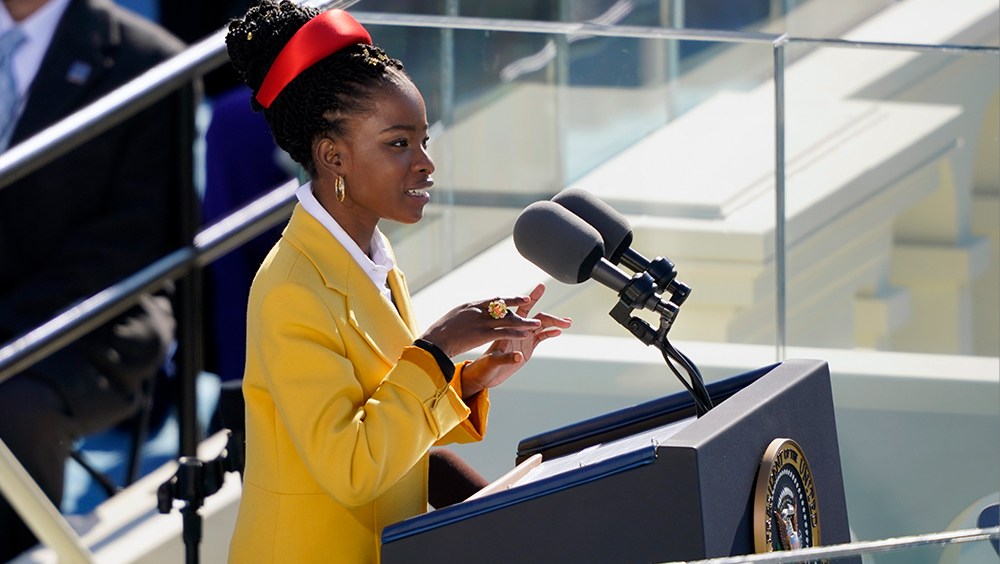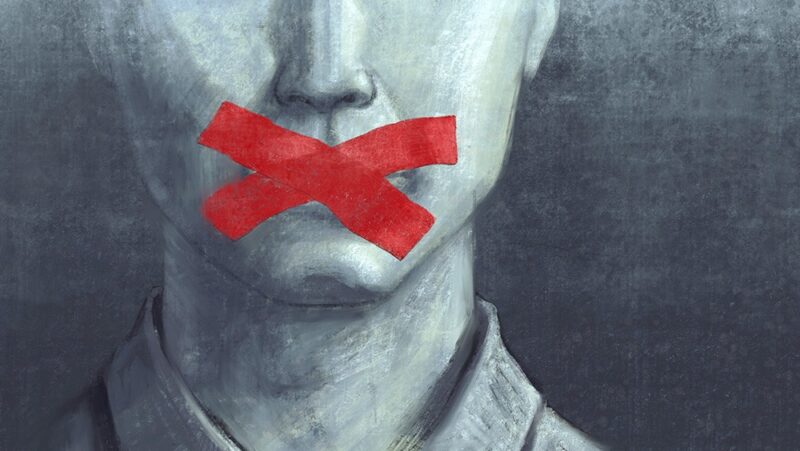Prohibited Poetry: 13 Poems That Faced Faced Banning Attempts

There was an Amendment, the First
Its words gave us freedom to burst
out in a song or poem so long
the government can’t punish as cursed
That limerick probably won’t be taught in any college poetry-writing classes. But it does show one thing about the First Amendment: It protects your right to write, recite and read your favorite poems.
Like songs, movies, books and the clothes you wear, creating and consuming poetry is protected free speech under the First Amendment. That means the government can’t punish you for what you say or write in a poem, just like punishing you for writing or reading a book is unlawful under the First Amendment.
There are exceptions to First Amendment protections for speech, such as obscenity, true threats, libel and defamation. But these exceptions are very case specific and can’t be applied broadly to ban all poems dealing with a certain subject.
RELATED: 15 of the most famous banned books in U.S. history
In other words, the government can censor poems in some instances, just like other forms of speech can be legally punished. However, modern censorship, especially preventing someone from publishing a collection of poems or arresting them for reciting poems on stage, is very rare. The contemporary use of censorship is restricting based on standards of age and educational appropriateness the availability of poetry in public schools and public libraries, which are bound by the First Amendment, unlike private schools, which are not.
Discover 13 examples of banned poems and times when poetry was censored, challenged or restricted
For this list, we include poems and poetry books that have been:
Banned: The work is removed entirely from public schools, libraries and/or bookstores.
Restricted: The published poems remain on shelves, but there is a minimum age requirement or some prior permission required (usually parental permission).
Censored: The poetry work remains on shelves but has been edited or altered to remove sensitive language or topics.
Challenged: Someone has petitioned the government to remove the book from the shelves, but there’s been no action yet. Challenging a book or poem in a public-school curriculum or library is part of the First Amendment right to petition. It also may affect access to books or poems as administrators may ban or restrict a book immediately upon the filing of a challenge. Administrators might choose not to stock or to remove controversial books in the future.
Here are 13 examples of banned poems and times when poetry was censored, challenged or otherwise restricted in public settings.
“Amores” and “Ars Amatoria” by Ovid
The Roman poet and writer Ovid has the distinction of being the only person on this list whose work was banned in more than three centuries, hundreds of years after his death. The works “Amores” (Loves) and “Ars Amatoria” (Art of Love) deal with love, sex and adultery, and include advice on these topics. They were considered taboo when written in the year 3 C.E. and for centuries following. Religious censors in Italy and England burned translated copies in the 15th and 16th centuries. Several hundred years and thousands of miles away, U.S. customs officials banned imports of the published work in 1930.
Works by William Shakespeare
William Shakespeare’s 16th and early 17th century plays, sonnets and long-form poetry have been taught in many classes. His works highlight tragedy and comedy and deal with subjects still seen today, causing bans, challenges and teaching restrictions based on sex, profane language, humor, suicide and other controversial topics. Schools in New York and Michigan have banned the use of “The Merchant of Venice” for its perceived antisemitism. In 1996, a New Hampshire school banned “Twelfth Night” because it involved a woman disguising herself as a man to attract another woman. A 2011 Arizona law made “The Tempest” unfit for classroom use, with its theme of a banished duke seeking revenge. The law banned coursework that could “promote the overthrow of the United States government; promote resentment toward a race or class of people; are designed primarily for pupils of a particular ethnic group; advocate ethnic solidarity instead of the treatment of pupils as individuals.” Shakespeare’s play was caught up in a larger fight over Mexican American and ethnic studies curriculum under the law. According to Salon, teachers were told “to stay away from any units where ‘race, ethnicity and oppression are central themes,’ including the teaching of Shakespeare's classic in Mexican American literature courses.”
“The Canterbury Tales” by Geoffrey Chaucer
It’s possible you read some of Geoffrey Chaucer’s 14th century “The Canterbury Tales” in high school or college English class. And if you remember anything, it’s probably that the characters stand out more than the stories. Perhaps the best-known character is the Wife of Bath, whose story is used as a critique of the patriarchal society of Chaucer’s time. His themes of sexuality and romance while poking fun at the powerful Catholic Church structure meant Chaucer was bound to have pushback in his time. He still got it centuries later. In the late 1800s, antiobscenity advocates in the U.S., particularly the New York Society for the Prevention of Vice, successfully got Congress to pass the Comstock Act, named for the group’s founder, Anthony Comstock, a U.S. Postal inspector. The law, parts of which as of 2024 are still in effect, outlawed sending indecent or lewd materials through the U.S. mail. That included many books and works of poetry, including Chaucer’s work. The Supreme Court has since narrowed the definition of obscenity, and it does not include Chaucer’s work or most books that previously were banned under the law.
“Leaves of Grass” by Walt Whitman
Today, Walt Whitman is praised and widely studied as a U.S. poet. But in his time, he generated widespread negative reactions. His 1855 “Leaves of Grass” poetry collection saw banning attempts almost immediately given its themes of sexuality and homoeroticism. Libraries in multiple states refused to have it on their shelves. Antiobscenity groups tried to persuade bookstores not to sell it. Fellow poet Ralph Waldo Emerson even tried to convince Whitman to change some lines before publishing, knowing they wouldn’t be well received. Emerson was correct. Twenty years after it was first published, Boston banned “Leaves of Grass” and threatened to prosecute its publisher.
“Howl” by Allen Ginsberg
Known for his in-your-face depictions of sex, use of profane language and lines against U.S. policy, Allen Ginsberg leaned into the Beat Generation of which he was a major part. His “Howl” started as a live reading in San Francisco, the capital of the Beat writers, in 1955. Fellow poet Lawrence Ferlinghetti asked to publish “Howl” and collected it with other Ginsberg poems. Anticipating a backlash, Ferlinghetti preemptively got the ACLU on board to help with any censorship attempts. When printed in England and imported to the U.S., book copies got seized by customs officials. Ferlinghetti then tried to publish it in the U.S., only to have a police sting operation result in his arrest for trying to sell “obscene” material. In the resulting trial, a judge ruled the book had “redeeming social importance” and was not obscene, meaning it could be published and sold with First Amendment protections. The affair led the National Coalition Against Censorship to say Ginsberg’s most recognized work “has faced more scrutiny than perhaps any other work of poetry.”
“We Real Cool” by Gwendolyn Brooks
At 10 lines and 32 words, Gwendolyn Brooks’ “We Real Cool” is the shortest work on this list. But in those 10 lines was one – “jazz June” – that got it banned from Mississippi and West Virginia classrooms in the 1970s. It highlights teenage boys, out of school, playing pool in the summer. Some people believed the line “jazz” was sexual innuendo. Brooks denied that, saying she “meant that these young men would have wanted to challenge anything that was accepted by ‘proper’ people.” But she also said poetry leaves room for individual readers to interpret beyond what the poet intends. Brooks died in 2000, having authored more than 20 poetry books and novels.
“A Light in the Attic” by Shel Silverstein
Most books and poems on modern banned and challenged lists deal with themes of race and sexuality. Shel Silverstein’s books, including his second-published poetry collection “A Light in the Attic” from 1981, broaches more innocent topics: mischievous kids, complex emotions, and absurd situations for humans and animals. It became one of the most-banned books of the 1990s in schools across the U.S. Multiple districts banned it for elementary readers because it “encourages children to break dishes so they won’t have to dry them.” Another banned the book because it “glorified Satan, suicide, and cannibalism.” Despite the school banning attempts, it was among the most popular books of its time, staying on the bestseller list for 182 weeks.
“Your Revolution” by Sarah Jones
Sarah Jones’ 2001 work is classified as a poem and song, landing it on similar lists of banned songs. Jones’ lyrical beat poem “Your Revolution” called out hip hop for its treatment and portrayal of women by using explicit lyrics that included the N-word and sexual content. The FCC called out Jones and attempted to fine a radio station for playing it. Jones sued the FCC, but the case was dismissed. Ultimately the FCC ruled “Your Revolution” complied with its rules, and the station was not fined. Other stations declined to play Jones’ work while the case was ongoing.
“Milk and Honey” by Rupi Kaur
Born in India and emigrated to Canada, Rupi Kaur explores the themes of her upbringing and family background in “Milk and Honey,” which she originally self-published in 2014. It was picked up by a large publisher in 2017 and found commercial success as a New York Times bestseller. It also found backlash and banning attempts. PEN America listed it as one of the most banned books in its 2022-2023 report. Multiple Missouri, Texas and Oregon school districts banned or tried to ban the book for its themes of sexual assault, violence and self-harm.
“The Hill We Climb” by Amanda Gorman
Amanda Gorman wrote and recited “The Hill We Climb” for President Joe Biden’s inauguration in January 2021, gaining her an international audience. Her subsequent poetry collection book, titled “Call Us What We Carry,” was a bestseller, attracting critical acclaim. It included the inaugural poem. In 2023, Gorman’s work made headlines when a Florida school challenged the use of “The Hill We Climb” in classroom lessons. Headlines at the time said the poem had been “banned” by a Florida district. Gorman’s poem was not fully banned by the district, but it was restricted and moved to a library section for older middle school students.
At least one parent had objected to its classroom teaching and availability for elementary students, along with other books about Cuba and Black history. The Miami Herald interviewed the parent, Daily Salinas, who said she “‘is not for eliminating or censoring any books.’ Instead, she wants materials to be appropriate and for students ‘to know the truth’ about Cuba, she said in Spanish.” The Guardian later reported that Salinas had ties to the Proud Boys and had posted antisemitic comments online.
Banned poems and the First Amendment
Just like poems have many different styles, voices, structures and forms, the ways poems are banned aren’t all the same. The term “ban” isn’t always the most precise way of describing ways poems and collections of poetry are kept away from people’s eyes and ears. Sometimes restrictions, challenges, censorship or public pressure against bookstores and libraries are the ways people have their access to poems limited.
The First Amendment does not protect against all kinds of bans; it only applies to government actions. If a nonpublic school wanted to ban works of poetry because the themes don’t align with the school’s values, there’s no First Amendment issue involved. If a privately owned bookstore didn’t want to sell those same works, that wouldn’t violate the First Amendment either.
And even though the First Amendment broadly protects many forms of expression, including poetry, some types of writing and expression can be limited under the First Amendment, if it falls into certain categories like obscenity. Though what qualifies as unprotected obscenity and what people think of as obscene are often two different things.
One simple yet explanatory poem might sum it up best:
Books are widely read. Poems are, too.
That’s largely because
The First Amendment’s for you.
Art Censorship: First Amendment Violation or Private Free Speech?
Perspective: Tide May be Turning Toward Religious Exemptions From Vaccine Mandates
Related Content
2025 Al Neuharth Free Spirit and Journalism Conference
All-Expenses-Paid Trip To Washington, D.C.
June 22-27, 2025
Skill-Building
Network Growing
Head Start On Your Future

